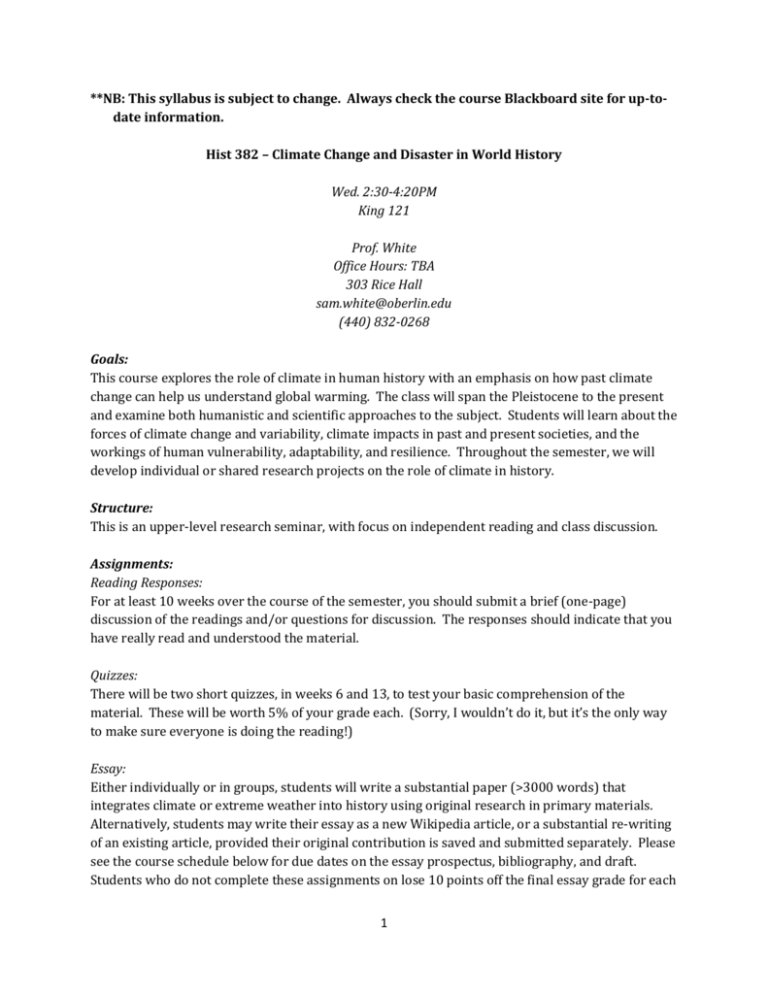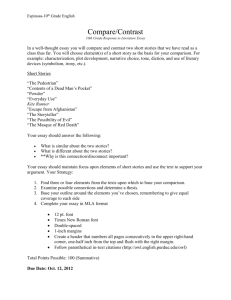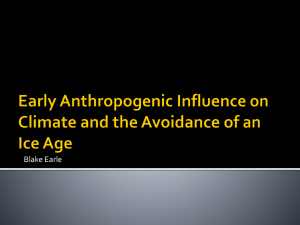**NB: This syllabus is subject to change. Always check the course
advertisement

**NB: This syllabus is subject to change. Always check the course Blackboard site for up-todate information. Hist 382 – Climate Change and Disaster in World History Wed. 2:30-4:20PM King 121 Prof. White Office Hours: TBA 303 Rice Hall sam.white@oberlin.edu (440) 832-0268 Goals: This course explores the role of climate in human history with an emphasis on how past climate change can help us understand global warming. The class will span the Pleistocene to the present and examine both humanistic and scientific approaches to the subject. Students will learn about the forces of climate change and variability, climate impacts in past and present societies, and the workings of human vulnerability, adaptability, and resilience. Throughout the semester, we will develop individual or shared research projects on the role of climate in history. Structure: This is an upper-level research seminar, with focus on independent reading and class discussion. Assignments: Reading Responses: For at least 10 weeks over the course of the semester, you should submit a brief (one-page) discussion of the readings and/or questions for discussion. The responses should indicate that you have really read and understood the material. Quizzes: There will be two short quizzes, in weeks 6 and 13, to test your basic comprehension of the material. These will be worth 5% of your grade each. (Sorry, I wouldn’t do it, but it’s the only way to make sure everyone is doing the reading!) Essay: Either individually or in groups, students will write a substantial paper (>3000 words) that integrates climate or extreme weather into history using original research in primary materials. Alternatively, students may write their essay as a new Wikipedia article, or a substantial re-writing of an existing article, provided their original contribution is saved and submitted separately. Please see the course schedule below for due dates on the essay prospectus, bibliography, and draft. Students who do not complete these assignments on lose 10 points off the final essay grade for each 1 assignment missed. Detailed writing instructions will be posted to Blackboard. We will go over topics and make arrangements for shared projects in class. During week 9, while I am away at a conference, the class will meet with a research librarian for strategies on preparing a bibliography. Final Average: 30% participation 10% quizzes 10% reading papers 50% essay (including completion of prospectus, bibliography, and draft) Course Policies: Attendance: Attendance will be taken each class. Students are expected to participate in class and complete the assigned readings each week. Much of the material in class will not be covered in the readings but may be on the quizzes, and so students should obtain notes for any missed classes. Honor Code: All course work is governed by Oberlin's Honor Code. If you have a question about how the Honor Code applies to a particular assignment, you should ask me in advance of the due date. Further information about the honor code will be posted along with instructions for particular assignments. E-mail: I will answer short e-mails Mon-Fri 9-5. If you have any questions that require a long answer, please come by my office during office hours instead. I will give feedback on any draft or outline of your class work provided you send it in at least 48 hours before the deadline—the longer I have, the better the feedback. Grading: A (90-100), B (80-89), C (70-79), D (60-69), F (below 60). Plus and minus grades for scores within two points of the next letter grade. Submitting Work: All written work must be submitted by e-mail in a MS Word compatible format. Required Books (available at the bookstore and on main library reserve): Jared Diamond, Collapse: How Societies Choose to Fail or Succeed (New York: Viking, 2005). William F. Ruddiman, Plows, Plagues, and Petroleum: How Humans Took Control of Climate (Princeton, NJ: Princeton University Press, 2005). Wolfgang Behringer, A Cultural History of Climate (Cambridge: Polity Press, 2010). William Meyer, Americans and Their Weather (New York: Oxford University Press, 2000). Brian Fagan, The Long Summer: How Climate Changed Civilization (New York: Basic Books, 2004). **All other articles and chapters not in the course books will be posted to Blackboard. Course Schedule: Week 1: Introduction (2/6) 2 Sam White, “Climate Change in Global Environmental History,” in A Companion to Global Environmental History, ed. John McNeill and Erin Maulden (London: Blackwell, 2012), 394-410. Mark Carey, “Climate and History: A Critical Review of Historical Climatology and Climate Change Historiography,” Wiley Interdisciplinary Reviews: Climate Change 3 (2012): 233–49. Week 2: Climate, Evolution, and Civilization (2/13) Case Study: The Ancient Near East William F. Ruddiman, Plows, Plagues, and Petroleum: How Humans Took Control of Climate (Princeton, NJ: Princeton University Press, 2005), 1-60. Brian Fagan, The Long Summer: How Climate Changed Civilization (New York: Basic Books, 2004), 59-189. Karl W. Butzer, “Collapse, Environment, and Society,” Proceedings of the National Academy of Sciences 109 (2012): 3632–39. Week 3: Complexity, Vulnerability, and Resilience (2/20) Case Study: The Maya and Anasazi Jared Diamond, Collapse: How Societies Choose to Fail or Succeed (New York: Viking, 2005), 136-77. B. L. Turner and Jeremy A. Sabloff, “Classic Period Collapse of the Central Maya Lowlands: Insights About Human–Environment Relationships for Sustainability,” Proceedings of the National Academy of Sciences 109 (2012): 13908–14. Brian Walker et al., “Resilience, Adaptability, and Transformability in Social-Ecological Systems,” Ecology and Society 9, no. 2 (2004): 5. Week 4: Climate, Culture, and Adaptability Case Study: Greenland and Iceland (2/27) Jared Diamond, Collapse: How Societies Choose to Fail or Succeed (New York: Viking, 2005), 178-276. L. K. Barlow et al., “Interdisciplinary Investigations of the End of the Norse Western Settlement in Greenland,” The Holocene 7 (1997): 489–99. Andrew J. Dugmore et al., “Cultural Adaptation, Compounding Vulnerabilities and Conjunctures in Norse Greenland,” Proceedings of the National Academy of Sciences 109 (2012): 3658–63. Joel Berglund, “Did the Medieval Norse Society in Greenland Really Fail?” in Questioning Collapse: Human Resilience, Ecological Vulnerability, and the Aftermath of Empire, ed. Patricia A. McAnany and Norman Yoffee (New York: Cambridge University Press, 2010), 45–70. Week 5: Climate and Crisis in Agrarian Systems (3/6) Case Study: The Little Ice Age (1) Wolfgang Behringer, A Cultural History of Climate (Cambridge: Polity Press, 2010), 85-120. Brian Fagan, The Little Ice Age (New York: Basic Books, 2000), 79-147. Bruce Campbell, “Nature as Historical Protagonist: Environment and Society in Pre-Industrial England,” Economic History Review (2009): 1–34. Sam White, “The Little Ice Age Crisis in the Ottoman Empire: A Conjuncture in Middle East Environmental History,” in Water on Sand: The Environmental History of the Middle East, ed. Alan Mikhail (New York: Oxford University Press, 2012). 3 Week 6: Cultural Impacts (3/13) Case Study: The Little Ice Age (2) Wolfgang Behringer, A Cultural History of Climate (Cambridge: Polity Press, 2010), 121-67. Christian Pfister, “Climatic Extremes, Recurrent Crises and Witch Hunts: Strategies of European Societies in Coping with Exogenous Shocks in the Late Sixteenth and Early Seventeenth Centuries,” Medieval History Journal 10 (2007): 33–73. Christian Pfister, “The Monster Swallows You”: Disaster Memory and Risk Culture in Western Europe, 1500-2000, Rachel Carson Center Perspectives 2011/1 (Munich: Rachel Carson Center, 2011). Pieter Roelofs, ed., Hendrick Avercamp: Master of the Ice Scene (Amsterdam: Rijksmuseum, 2009), art and essay selections. **Quiz 1** Week 7: Climate and Political Crisis (3/20) Case Study: The Little Ice Age (3) Geoffrey Parker, Global Crisis: War, Climate Change and Catastrophe in the Seventeenth Century (New Haven: Yale University Press, 2013), selections TBA. Richard Grove, “The Great El Niño of 1789-93 and Its Global Consequences,” The Medieval History Journal 10 (2007): 75–98. **Essay prospectus due in class** Week 8: **Spring Break** Week 9: Research Librarian Appointment (4/3) Week 10: Climate and Weather in Modern Life (4/10) Case Study: America William Meyer, Americans and Their Weather (New York: Oxford University Press, 2000). A. Cash Koeniger, “Climate and Southern Distinctiveness,” The Journal of Southern History 54 (1988): 21–44. Week 11: Discovering Global Warming (4/17) Spencer Weart, The Discovery of Global Warming, revised ed. (Cambridge, MA: Harvard University Press, 2008). **Essay bibliography and summary of finds due in class** Week 12: The Anthropocene (4/24) William F. Ruddiman, Plows, Plagues, and Petroleum: How Humans Took Control of Climate (Princeton, NJ: Princeton University Press, 2005), 61-146. Will Steffen, Paul J. Crutzen, and John R. McNeill, “The Anthropocene: Are Humans Now Overwhelming the Great Forces of Nature?” AMBIO: A Journal of the Human Environment 36 (2007): 614–21. James R. Fleming, “The Climate Engineers,” Wilson Quarterly 31 (2007): 46–60. 4 **Quiz 2** Week 13: The Future (5/1) William F. Ruddiman, Plows, Plagues, and Petroleum: How Humans Took Control of Climate (Princeton, NJ: Princeton University Press, 2005), 149-74. Jay Gulledge, “Three Plausible Scenarios of Future Climate Change,” in Climatic Cataclysm: The Foreign Policy and National Security Implications of Climate Change, ed. Kurt M. Campbell (Washington, DC: Brookings Institution Press, 2008), 49–96. John R. McNeill, “Can History Help Us with Global Warming?” in Climatic Cataclysm: The Foreign Policy and National Security Implications of Climate Change, ed. Kurt M. Campbell (Washington, DC: Brookings Institution Press, 2008), 26–48. Mike Hulme, “Reducing the Future to Climate: A Story of Climate Determinism and Reductionism,” Osiris 26 (2011): 245–66. **Essay draft due Friday by 8pm** Week 14: Conclusion (5/8) (No new reading: Please come prepared to discuss your research projects.) Reading Period May 12-14 Your essay is due during the allotted final exam time as your “final project.” Late papers will not be accepted. 5








